现在完成时练习 (2)
英语现在完成时专题练习(及答案)
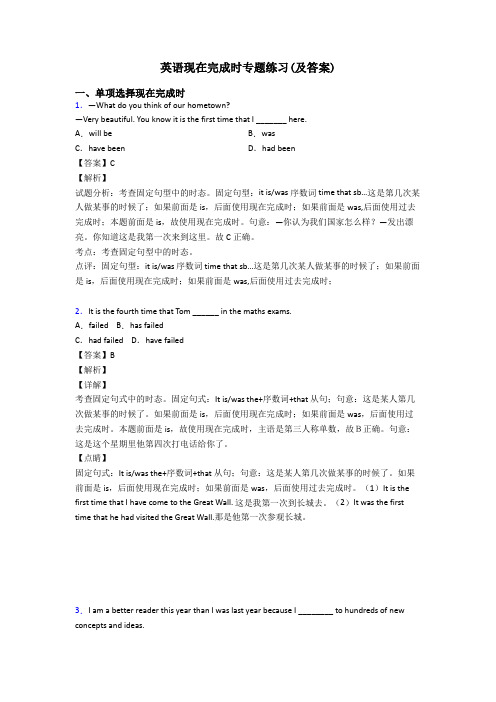
英语现在完成时专题练习(及答案)一、单项选择现在完成时1.―What do you think of our hometown?―Very beautiful. You know it is the first time that I _______ here.A.will be B.wasC.have been D.had been【答案】C【解析】试题分析:考查固定句型中的时态。
固定句型:it is/was 序数词time that sb…这是第几次某人做某事的时候了;如果前面是is,后面使用现在完成时;如果前面是was,后面使用过去完成时;本题前面是is,故使用现在完成时。
句意:—你认为我们国家怎么样?—发出漂亮。
你知道这是我第一次来到这里。
故C正确。
考点:考查固定句型中的时态。
点评:固定句型:it is/was 序数词time that sb…这是第几次某人做某事的时候了;如果前面是is,后面使用现在完成时;如果前面是was,后面使用过去完成时;2.It is the fourth time that Tom ______ in the maths exams.A.failed B.has failedC.had failed D.have failed【答案】B【解析】【详解】考查固定句式中的时态。
固定句式:It is/was the+序数词+that 从句;句意:这是某人第几次做某事的时候了。
如果前面是is,后面使用现在完成时;如果前面是was,后面使用过去完成时。
本题前面是is,故使用现在完成时,主语是第三人称单数,故B正确。
句意:这是这个星期里他第四次打电话给你了。
【点睛】固定句式:It is/was the+序数词+that 从句;句意:这是某人第几次做某事的时候了。
如果前面是is,后面使用现在完成时;如果前面是was,后面使用过去完成时。
(1)It is the first time that I have come to the Great Wall. 这是我第一次到长城去。
现在完成时的用法及练习题2

现在完成时的用法1.定义:现在完成时是由助动词 have(has)+动词的过去分词构成。
助动词说明该谓语是属于现在时范围。
它和主语的人称、数要保持一致。
过去分词是主要的谓语动词,说明句子的意2.用法(1)表示动作发生在过去某个不确定的时间,但对现在留下了某种影响和结果。
常被just、already、yet 等副词修饰。
-Have you had lunch yet? -Yes,I have. I’ve just had it.你(已经)吃午饭了吗?我刚刚吃过。
(现在我不饿了)(2)表示从过去某一时刻开始一直持续到现在的动作或状态。
这个动作可能刚停止,可能仍然在进行。
常带有for和since等表示一段时间的状语。
①.He has taught here since 1981 他自1981年就在这儿教书。
(可能还要继续教)②. I have’t seen her for four years.(3)表示说话前发生过一次或多次的动作,现在成为一种经验,一般译为汉语“过”,常带有twice,ever,never,three times等时间状语。
I have been to Beijing twice.3.现在完成时的时间状语(1)现在完成时属于现在时范围,故不能和过去的时间状语连用。
如:yesterday,last Sunday,in1990,three years ago等。
但是,在强调动作产生的后果和影响时,可以和一些表示不确定的时间状语连用。
a. 用副词already和yet。
already一般用于肯定句中,yet一般用于否定句和疑问句中。
如:We have already finished our homework.我们已完成作业了。
They haven’t finished their homework yet.他们还没有完成作业。
b.用ever 和never。
多用于否定或疑问句中,表示“曾经”或“从未“等。
现在完成时练习题及答案(精华版)
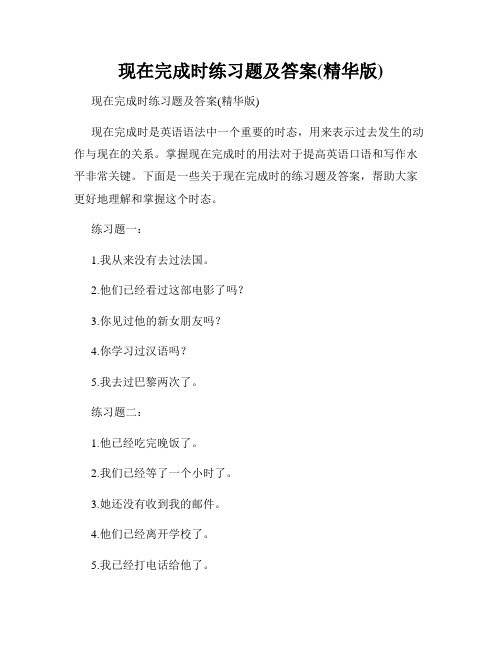
现在完成时练习题及答案(精华版)现在完成时练习题及答案(精华版)现在完成时是英语语法中一个重要的时态,用来表示过去发生的动作与现在的关系。
掌握现在完成时的用法对于提高英语口语和写作水平非常关键。
下面是一些关于现在完成时的练习题及答案,帮助大家更好地理解和掌握这个时态。
练习题一:1.我从来没有去过法国。
2.他们已经看过这部电影了吗?3.你见过他的新女朋友吗?4.你学习过汉语吗?5.我去过巴黎两次了。
练习题二:1.他已经吃完晚饭了。
2.我们已经等了一个小时了。
3.她还没有收到我的邮件。
4.他们已经离开学校了。
5.我已经打电话给他了。
练习题三:1.我已经做完作业了。
2.你刚才说过这个笑话了吗?3.他们已经买好了礼物。
4.我已经读完这本书了。
5.你已经看过这个电影了吗?练习题四:1.他们已经结婚十年了。
2.我们还没有决定去哪里度假。
3.她去过中国吗?4.你喝过咖啡吗?5.我已经完成了这个项目。
答案一:1. I have never been to France.2. Have they watched this movie?3. Have you seen his new girlfriend?4. Have you studied Chinese?5. I have been to Paris twice.答案二:1. He has finished dinner.2. We have been waiting for an hour.3. She hasn't received my email yet.4. They have left school.5. I have called him.答案三:1. I have finished my homework.2. Did you tell this joke just now?3. They have bought gifts.4. I have finished reading this book.5. Have you seen this movie?答案四:1. They have been married for ten years.2. We haven't decided where to go on vacation yet.3. Has she been to China?4. Have you ever drunk coffee?5. I have completed this project.。
现在完成时练习题及答案(精 华版)
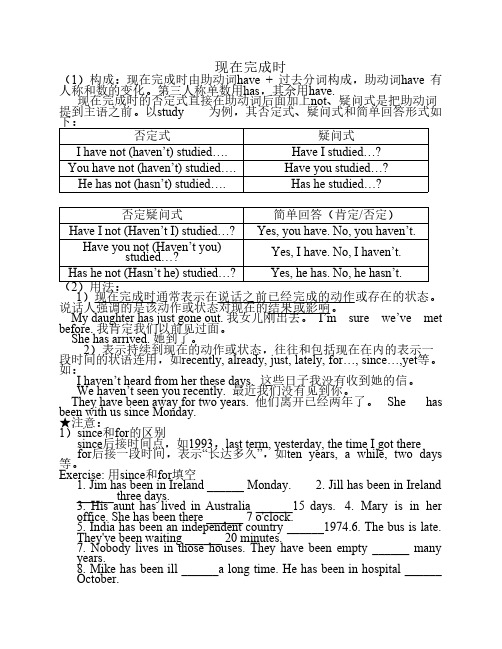
现在完成时(1)构成:现在完成时由助动词have + 过去分词构成,助动词have 有人称和数的变化。
第三人称单数用has,其余用have.现在完成时的否定式直接在助动词后面加上not、疑问式是把助动词提到主语之前。
以study 为例,其否定式、疑问式和简单回答形式如下:否定式疑问式I have not (haven’t) studied….Have I studied…?You have not (haven’t) studied….Have you studied…?He has not (hasn’t) studied….Has he studied…?否定疑问式简单回答(肯定/否定)Have I not (Haven’t I) studied…?Yes, you have. No, you haven’t.Have you not (Haven’t you)studied…?Yes, I have. No, I haven’t.Has he not (Hasn’t he) studied…?Yes, he has. No, he hasn’t.(2)用法:1)现在完成时通常表示在说话之前已经完成的动作或存在的状态。
说话人强调的是该动作或状态对现在的结果或影响。
My daughter has just gone out. 我女儿刚出去。
I’m sure we’ve met before. 我肯定我们以前见过面。
She has arrived. 她到了。
2)表示持续到现在的动作或状态,往往和包括现在在内的表示一段时间的状语连用,如recently, already, just, lately, for…, since…,yet等。
如:I haven’t heard from her these days. 这些日子我没有收到她的信。
We haven’t seen you recently. 最近我们没有见到你。
现在完成时练习题122道(含答案)
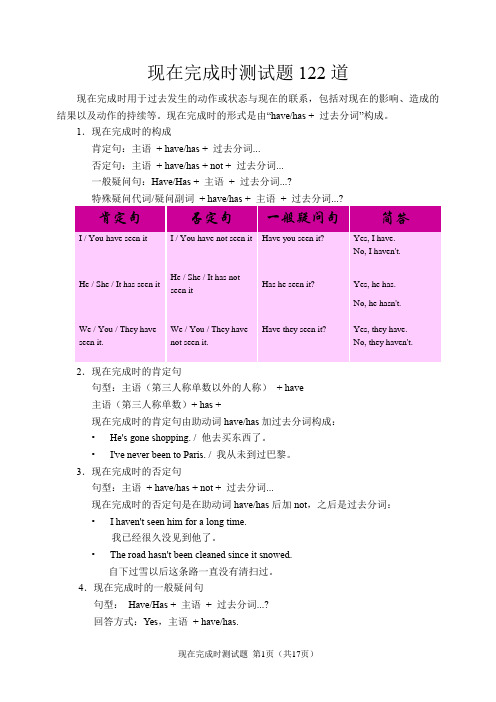
现在完成时测试题122道现在完成时用于过去发生的动作或状态与现在的联系,包括对现在的影响、造成的结果以及动作的持续等。
现在完成时的形式是由“have/has + 过去分词”构成。
1.现在完成时的构成肯定句:主语+ have/has + 过去分词...否定句:主语+ have/has + not + 过去分词...一般疑问句:Have/Has + 主语+ 过去分词...?特殊疑问代词/疑问副词+ have/has + 主语+ 过去分词...?肯定句否定句一般疑问句简答I / You have seen it I / You have not seen it Have you seen it? Yes, I have.No, I haven't.He / She / It has seen it He / She / It has notseen itHas he seen it? Yes, he has.No, he hasn't.We / You / They have seen it. We / You / They havenot seen it.Have they seen it? Yes, they have.No, they haven't.2.现在完成时的肯定句句型:主语(第三人称单数以外的人称)+ have主语(第三人称单数)+ has +现在完成时的肯定句由助动词have/has加过去分词构成:• He's gone shopping. / 他去买东西了。
• I've never been to Paris. / 我从未到过巴黎。
3.现在完成时的否定句句型:主语+ have/has + not + 过去分词...现在完成时的否定句是在助动词have/has后加not,之后是过去分词:• I haven't seen him for a long time.我已经很久没见到他了。
现在完成时四步训练

现在完成时(一)1、什么是现在完成时?(1)表示动作带现在为止已经完成或刚完成,汉语常用―了‖表示,例如:The train has already arrived.火车已经到了。
(2)表示动作在过去完成,表示经验,汉语常用―过‖表示,例如:I have been to the Great Wall. 我已经去过长城。
2、结构:have + V (过去分词) haven’t + V (过去分词)助动词has + V (过去分词) hasn’t + V (过去分词)助动词3、标志现在完成时的时间副词:already(已经,用于肯定句中,放在助动词和过去分词之间,也可以放在句末)例句:I have already read the book.我已经读过这本书。
yet(已经,用于否定句和疑问句中)例句:Have you finished the work yet? No, not yet.你完成这项工作了吗?还没有。
never(从不,从来没有,用于肯定句中,但句子意思表示否定, 放在助动词和过去分词之间)例句:She has never been to Xinjiang. 她从没去过新疆。
ever(曾经, 放在助动词和过去分词之间),例句:Have you ever seen the film before? 你以前曾经看过这部电影吗?just (刚刚,放在助动词和过去分词之间。
注意与just now的区别,just now是指刚才,用于一般过去时。
)例句:They have just found the lost cat. 他们刚刚找到那只丢失的小猫。
4、动词的过去分词我们已经学过动词的过去式,大部分动词的过去分词与过去式相同。
要求熟记。
练习一、按要求改写句子,并翻译句子。
1.My parents saw the film last night.(用already改写)My parents ________ _______ ________ the film. 翻译:___________________________ 2.They visited Shanghai last month.(用never改写)They ________ ________ ________ ___________. 翻译:________________________ 3.She did her homework at home. (用already改写)She ______________________ at home. 翻译:__________________________4.We often have supper in the restaurant. (用ever改写)We _________________________ in the restaurant. 翻译:______________________5.Janet made a cake for her mother yesterday. (用just改写)Janet ____________________ for her mother. 翻译:__________________________二、句型转换改为一般疑问句和否定句1. They have already been to Britain.______ they _______ to Britain yet?They _______ ________ _________ to Britain __________.2. I have ever visited John’s house._______ you ______________ ___ John’s house?I ___________________ John’s house.3. John has borrowed two books from the library._________ John _______________ two books from the library?John _________________________ two books from the library.4. Peter has bought a ticket for the concert.______________________________________?______________________________________5. Annie has written a letter to my pen friend.______________________________________?______________________________________三、用正确的时态填空。
现在完成时精讲及练习(附答案)
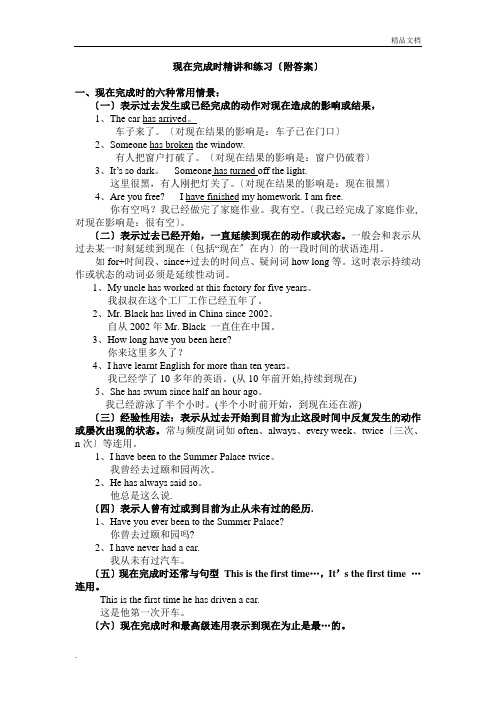
现在完成时精讲和练习〔附答案〕一、现在完成时的六种常用情景:〔一〕表示过去发生或已经完成的动作对现在造成的影响或结果,1、The car has arrived。
车子来了。
〔对现在结果的影响是:车子已在门口〕2、Someone has broken the window.有人把窗户打破了。
〔对现在结果的影响是:窗户仍破着〕3、It’s so dark。
Someone has turned off the light.这里很黑,有人刚把灯关了。
〔对现在结果的影响是:现在很黑〕4、Are you free? I have finished my homework. I am free.你有空吗?我已经做完了家庭作业。
我有空。
〔我已经完成了家庭作业,对现在影响是:很有空〕。
〔二〕表示过去已经开始,一直延续到现在的动作或状态。
一般会和表示从过去某一时刻延续到现在〔包括“现在〞在内〕的一段时间的状语连用。
如for+时间段、since+过去的时间点、疑问词how long等。
这时表示持续动作或状态的动词必须是延续性动词。
1、My uncle has worked at this factory for five years。
我叔叔在这个工厂工作已经五年了。
2、Mr. Black has lived in China since 2002。
自从2002年Mr. Black 一直住在中国。
3、How long have you been here?你来这里多久了?4、I have learnt English for more than ten years。
我已经学了10多年的英语。
(从10年前开始,持续到现在)5、She has swum since half an hour ago。
我已经游泳了半个小时。
(半个小时前开始,到现在还在游) 〔三〕经验性用法:表示从过去开始到目前为止这段时间中反复发生的动作或屡次出现的状态。
2-4现在完成时讲解与练习
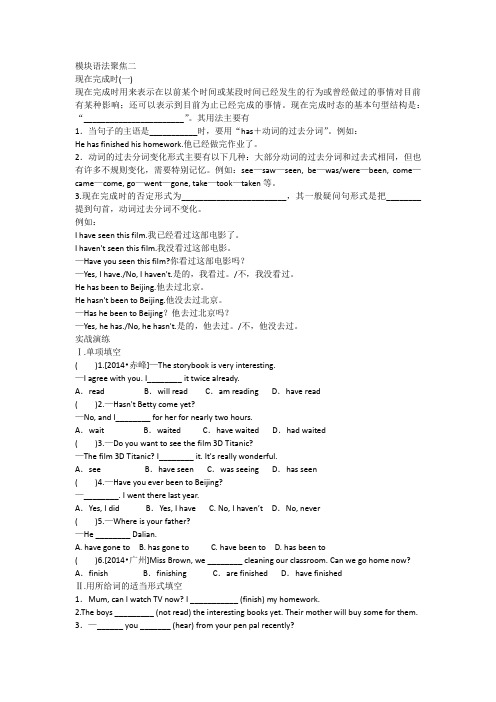
模块语法聚焦二现在完成时(一)现在完成时用来表示在以前某个时间或某段时间已经发生的行为或曾经做过的事情对目前有某种影响;还可以表示到目前为止已经完成的事情。
现在完成时态的基本句型结构是:“_______________________”。
其用法主要有1.当句子的主语是___________时,要用“has+动词的过去分词”。
例如:He has finished his homework.他已经做完作业了。
2.动词的过去分词变化形式主要有以下几种:大部分动词的过去分词和过去式相同,但也有许多不规则变化,需要特别记忆。
例如:see—saw—seen, be—was/were—been, come—came—come, go—went—gone, take—took—taken等。
3.现在完成时的否定形式为________________________,其一般疑问句形式是把________ 提到句首,动词过去分词不变化。
例如:I have seen this film.我已经看过这部电影了。
I haven't seen this film.我没看过这部电影。
—Have you seen this film?你看过这部电影吗?—Yes, I have./No, I haven't.是的,我看过。
/不,我没看过。
He has been to Beijing.他去过北京。
He hasn't been to Beijing.他没去过北京。
—Has he been to Beijing?他去过北京吗?—Yes, he has./No, he hasn't.是的,他去过。
/不,他没去过。
实战演练Ⅰ.单项填空()1.[2014•赤峰]—The storybook is very interesting.—I agree with you. I________ it twice already.A.read B.will read C.am reading D.have read()2.—Hasn't Betty come yet?—No, and I________ for her for nearly two hours.A.wait B.waited C.have waited D.had waited()3.—Do you want to see the film 3D Titanic?—The film 3D Titanic? I________ it. It's really wonderful.A.see B.have seen C.was seeing D.has seen()4.—Have you ever been to Beijing?—________. I went there last year.A.Yes, I did B.Yes, I have C. No, I haven’t D.No, never()5.—Where is your father?—He ________ Dalian.A. have gone toB. has gone toC. have been toD. has been to()6.[2014•广州]Miss Brown, we ________ cleaning our classroom. Can we go home now? A.finish B.finishing C.are finished D.have finishedⅡ.用所给词的适当形式填空1.Mum, can I watch TV now? I ___________ (finish) my homework.2.The boys _________ (not read) the interesting books yet. Their mother will buy some for them. 3.—______ you _______ (hear) from your pen pal recently?—Yes, I have. I ______ (get) a letter from him yesterday.4.—_______ you ever ________ (eat) the pizza?—No, I haven't.5.—_____ you _______(call) your mum yet?—Yes, I _____.I _____ _____(call) her last night.6.—______Jack __ ____(visit) his grandparents?—Not yet.7.—______ your parents ever ______(be) abroad?—Yes, just once.8.Who ________ (see) the film before?Ⅲ.按要求完成下列各题1.My parents have gone to England.(对画线部分提问)________________ parents gone?2.—Would you like some more food?—No, thanks. I _________ enough.(完成句子)3.Daming has climbed Mount Tai before.(改为一般疑问句并作否定回答) —________ Daming _________Mount Tai before?—______,he _________.4.He has waited for her for_2_hours.(对画线部分提问)____________________he waited for her?5.Jane came to China two years ago. (改为同义句)Jane ________ ________ in China for two years.模块语法聚焦三现在完成时(二)1.现在完成时态还可以用来表示“刚刚做完某事;已经做完某事”等,此时经常用just, already 和yet来表示,其中,________ 表示“刚刚”;________ 表示“已经”,一般置于________ 之后;just和already都用于肯定句中,在否定句和疑问句中则可用________,表示“还未”。
- 1、下载文档前请自行甄别文档内容的完整性,平台不提供额外的编辑、内容补充、找答案等附加服务。
- 2、"仅部分预览"的文档,不可在线预览部分如存在完整性等问题,可反馈申请退款(可完整预览的文档不适用该条件!)。
- 3、如文档侵犯您的权益,请联系客服反馈,我们会尽快为您处理(人工客服工作时间:9:00-18:30)。
现在完成时练习
语法
1、结构:have(has)+动词的过去分词
否定句:主语+haven’t(hasn’t)+动词的过去分词
一般疑问句:have(has)+主语+动词的过去分词
2、动词的过去分词:规则变化(和过去时一样)
不规则变化(见书本不规则动词表)
3、用法:
1)表过去发生的某一动作对现在造成的影响或结果。
Eg: I have just cleaned my clothes.我刚洗过衣服。
(“洗衣服”是发生在过去的动作,对现在造成的结果是“衣服干净了”。
)
I have just had my breakfast.(对现在的影响:不饿)
通常与already,just, ever,yet,never,before等时间副词连用。
2)表示过去已经开始,持续到现在的动作或状态,也可能继续下去的动作或状态。
*for+一段时间(延续性动词)eg: She has learned English for 3 years.
(但非延续性动词的否定形式也可以) eg: They haven’t seen each other for 10 years.
*since+过去时间点(过去时动词)注意不能和一段时间连用
Eg: They have lived here since 3 years ago.(They have lived here since 2005.)
Since+句子(一般过去时)
Eg: We have been good friends since she moved to Nantong.
一、、用所给词的适当形式填空。
1、It __________ (rain) for three days.
2、I don’t know this old man. I __________ (meet, never ) her.
3、let’s go to the cinema. No, I _________(see, already) the film.
4、We __________(finish, not ) our homework yet.
5、Mum _____________(come, not) yet. She will be back in a minute.
6、I _____________(know) Lily for two years.
7、Have you __________( write) three letters this moring?
8、Zhang Hong __________(make) many friends since she came to London.
9、__________ they __________(visit) the Great Wall?
Not yet.
10、Will the concert finish soon?
No, it ________ just __________ (start).
二、句型转换
1、They have already gone to school.(改为一般疑问句及否定回答)
__________ they __________ to school _________?
No, they ___________.
2、My father has read ten books about computers.(划线提问)
________ _________ __________ __________ your father ___________ about computers?
3、Miss Green has taught English for a few years.(同上)
_________ __________ ________ Miss Green taught English?
4、His family have owned this land since five years ago. (同上)
___________ ___________ owned this land ___________ five years?
5、My uncle left his hometown three months ago.(用for短语替换)
My uncle _________ ___________ __________ _________ his hometown __________ three months.
6、There are many changes in Nangtong.(改为现在完成时)
___________________________________________________ in Nangtong.
7、Tom has to finish the task within three hours.(改为一般疑问句)
_______________________________________________________ within three hours?
8、He has never been to Beijing before.(改为反义疑问句)
He has never been to Beijing before,____________ _____________?
三、改错
1、I have just now finished my homework. ( )____________
A B C D
2、I haven’t heared from you yet. ( )____________
A B C D
3、Since I start my middle school, I have come to school by bus on my own.. ( )_________
A B C D
4、The place is used to be the home of many wild animals. ( )___________
A B C D
5、I had an interview to the famous star this morning. ( )___________
A B C D
四、翻译下列句子
1、自从上周五以来,我没和我的表妹说过话。
2、我们已经学了六年英语。
3、父亲自从出生以来一直住在这儿。
4、格林一家去年搬到了阳光镇。
5、这个机场被使用了多久?5年多了。
